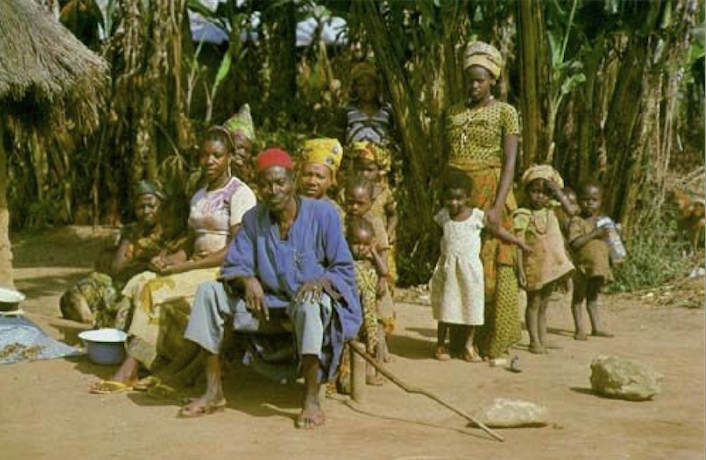What Is The Origin And Meaning Of The Word Igbo? Written by Ozodi Osuji Ph.D

Global News Centre
Written by Ozodi Osuji, Ph.D
Submitted by Ace Knight
We often take it for granted that we know what things are and mean but a little thinking reveals that we do not. Therefore, we must not be presumptuous; instead, we must always strive to understand what phenomena mean. In that light, what is the origin of the word Igbo and what exactly does it mean?
The other day, I read where someone employed the term Igbonics. I am not quite sure what he meant but I suspect that he probably implies some Igbos tendency to employ big, big words (apparently, to make them seem big) when small ones would do, and to write in what to Standard English speakers seems idiosyncratic syntax. (In writing for the public one should assume that the reader has minimum education, say, secondary school, hence able to understand one; convoluted and hifalutin words are not understood by the average reader hence those who employ them are not really communicating to any one; they are talking to themselves only!). Whatever the fellow meant, the term Igbonics got me thinking. You know what they say about word association, one word elicits similar words and things associated with them.
The term Ebonics came to my mind. White folks made fun of the specific manner in which black Americans speak their brand of English, such as using double negatives, such as:
“I don’t have no money” (for standard English; “I do not have any money”).
In response to this put down, some nationalistic black scholars came up with what they called Ebonics, Black English.
Ebonics is some sort of creole or Pidgin English associated with the way black Americans speak among themselves and at home (when they are not talking to white folks). Much of the way they speak, the way, is derived from West Africans; they translate African language sentence structure to English. For example Igbos place adjectives after nouns instead of before nouns (as in Standard English).
Consider. “Owu akwukwo oji”. English translation: It is a black book. The word oji (black) is the adjective; the word akwukwo (book) is the noun. Notice that the adjective is placed after the noun, whereas in Standard English the adjective is generally placed before the noun. If you literally translated the Igbo sentence to English it would not make sense: “it is book black” would be the literal translation.
Black Americans sometimes place their adjectives before their nouns, just as West Africans do thus giving American Standard English speakers the impression that they do not understand English language. Actually, they understand English language; they are merely translating English language to their West African form of sentence making; their manner of speaking English shows residuals from their African origin; or, as linguistic scholars would say: there is continuity and change in their sentence structures.
In case you are not into this sort of thing, Africans from different tribes settled in different parts of the USA and that affects their manner of speaking. For example, over 80% of the Africans who settled in Virginia and Maryland were Igbos. Their English sentence making follows Igbo sentence constructions. In fact, they employ phrases and clauses that Igbos still employ today! For example, young Igbos call each other Nna (father); young black Americans call each other daddy or daddio (meaning father!). They call their women mother (Igbos call their women Nne, that is, mother!).
The next time that you are with young African Americans and they lapse into speaking their so-called colloquial, or ebonics, pay attention and learn how their African language survived its Trans-Atlantic travel. If you get to understand black English you would find out that it reflects the way West Africans employ verbs, adjectives and phrases and clauses. I have digressed a lot. Let me return to the subject at hand.
The issue at hand is the origin of the word Igbo. I have thought about it and it does not make sense to me (nor would it make sense to Igbos from the Igbo heartland, core Igbos: Owerri-Orlu-Okigwe Igbos…the other Igbos were influenced by non-Igbos and therefore cannot really speak for Igbos; their culture is not pristine Igbos; they are strangers among us). I tried to see what the word Igbo means in Igbo language itself or what it is related to and it does not make sense. Therefore, I wondered whether it has foreign origin.
As you know, it is often the case that foreigners name a people, for example, the Romans, upon conquering a little island off Europe in 27 BC, called it Britannia, and, today people on that island call themselves British.
The Roman word for black is Aferi and from that black folks are called Africans.
The Portuguese and Spanish word for black is Negro or Negra and from that we have Negro for black folks.
The English word black now is used to refer to black people.
The Arab word for black is Sud and they called black folks “El Sud” and from that we have Sudanese, which actually stands for all black Africans in the Arab language, not just the people of the country of Sudan.
A European man called Amerigo Vespuci wrote an article in which he talked about the new world discovered by Christopher Columbus. Somehow, folks began calling the new world, a world he never set foot on, America, an alliteration of his name, Amerigo!
The point is that a people are often named by foreigners, so could it be that Igbos were named by none Igbos. Could it be the case that other Nigerian tribes called Igbos Ebos?
I did a little etymological search for the origin of ebony.
Ebony is a synonym for black. Ebony means jet black, pitch black, inky black (or Raven, bird, which is generally jet black in color, and or a black wood).
If Ebony is black and the world Igbo was spelled Eboe or Ebo by white folks centuries ago (when they encountered Igbo slaves) could it be that Ibo or Igbo is derived from Ebony, black?
The word ebony is derived from Latin (Ebeninus or Ebenus). The Latin Ebenus is derived from Greek Ebenos. The Greek Ebenus is derived from ancient Egyptian “Hebeny” (hbny).
Ebony is from Latin which is from Greek and which is from ancient Egyptian (Hebeny); now, could it be that Ebo or Eboe or Ibo or Igbo is derived from ancient Egyptian hebeny or from Latin ebeninus or from Greek ebenos or from English ebony?
Did the English call Igbo slaves in their world ebony (black) and from that Igbos called themselves eboe (igbonized the word). I do not know the answer to my question. I am not a scholar on Igbo matters.
Could a scholar on Igbo matters, not the pseudo scholars who take their fairy tales as Igbo history, enlighten us?
A few years ago, I pointed out that there is a village in Portugal called Biafra, just as there is town in Portugal called Lagos. A Portuguese sailor sailing on the coast of Guinea, aka West Africa who probably hailed from the village of Biafra in Portugal, in memory of his village, called where he was the Bight of Biafra. If that is the case to call Igbos Biafrans is giving them a Portuguese name hence insulting Africans. I thought that part of our emancipation from things European is to rename ourselves and expunge European names from our towns and psyches. But instead of learning and making the necessary correction some Igbo fools dug in and to compound their mistake tried to tell us that the word Biafra is Igbo in origin; they called it bia fra…whatever that gibberish is.
The tragedy of Alaigbo, Igbo land is that folks who know nothing about real Igbo people presumed to be the intellectual leaders of Alaigbo. (As I said somewhere, sometime in the future when I have time to devote to Igbo matters I will set out to deconstruct the rubbish that is currently passing as Igbo history and reconstruct it on a more rational and realistic term; for the time being I will let sleeping dogs lay and permit pseudo Igbos to pretend to lead the real Igbos.)
I want someone who can really do research and write that which is based on facts, is truthful rather than that which appeals to Igbos pride to tell us something about the origin of the word Eboe or Ibo or Igbo or ebony.
The other day I told folks that Booker T. Washington’s mother was Igbo; I got that information from reading several books on his life. Knowing my Igbos, now that the word is out I can see Igbos taking pride in Booker’s Igboness, just as they took pride from Olauda Equiano’s apparent Igboness. In the meantime, they forget that it was Igbos who sold Equano and Booker’s mother into slavery.
And having sold their people into slavery they do not feel bad about it; instead, they blame those they sold their kin folk to, white folks! What dreadful mental set! You sell your people, commit a sin against man and God and then blame those you sold them to? This is evil with a capital E.
Igbos like to take pride in outstanding people whose achievements make them seem a special people (such as Equano, Booker).
By the way, since Igbos did not fight to stop slavery and it took white men to stop it, if white men decide to re-enslave Africans today, Igbos would still sell Equano and Booker’s mother; they have not taken ownership of their mistake hence will keep repeating it.
While not doing anything to help each other become great they bask in each other’s greatness. In fact, they are more likely to pull each other down rather than uplift each other.
You know what they say, if you rely on an Igbo for help you are relying on the wind. Around Igbos you must be totally self-reliant and assume that Igbo are non-existent; all they know how to do is talk as if they are god while not understanding what God is, love.
Any way, if you do not know the answer to my question please keep quiet and do not even go there; I mean, do not try to answer it. I am generally not interested in propaganda that presents itself as scholarship; I can differentiate between the two.
Thanks for enlightening us.
PS: In reference to Igbos, the idiot name, Biafra, must go. Our land is Alaigbo, not Biafra, a Portuguese village. Don’t these pseudo Igbo scholars who call themselves Biafrans have shame? Don’t they have pride in things Africans (the word Africa is of Roman origin hence must be replaced with a different name, something rooted in …I was going to say Africa). Please do not insult me by calling me a Biafran, okay; if you are an intellectual nincompoop some of us do not share your mental status. Nor am I requesting your favor when I asked you to henceforth stop referring to Igbos as Biafrans; I am telling you what to do. It is time that real Igbos started speaking for Igbos instead of fake Igbos (such as Anambra folk) pretending to speak for real Igbos (Imo folk).
Ozodi Thomas Osuji is from Imo State, Nigeria. He obtained his PhD from UCLA. He taught at a couple of Universities and decided to go back to school and study psychology. Thereafter, he worked in the mental health field and was the Executive Director of two mental health agencies. He subsequently left the mental health environment with the goal of being less influenced by others perspectives, so as to be able to think for himself and synthesize Western, Asian and African perspectives on phenomena. Dr Osuji’s goal is to provide us with a unique perspective, one that is not strictly Western or African but a synthesis of both. Dr Osuji teaches, writes and consults on leadership, management, politics, psychology and religions. Dr Osuji is married and has three children; he lives at Anchorage, Alaska, USA.
He can be reached at: [email protected] (907) 310-8176



















 London
London
 Oregon
Oregon





Leave a Reply
You must be logged in to post a comment.